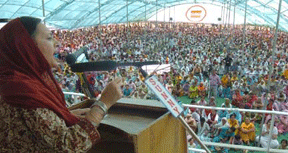 People's Democracy
People's Democracy
(Weekly
Organ of the Communist Party of India (Marxist)
No. 23
June 10, 2007
(Weekly
Organ of the Communist Party of India (Marxist)
|
Vol.
XXXI
No. 23 June 10, 2007 |
6th All India Conference Of AIAWU Begins With Massive Rally

Brinda Karat addressing the rally in Nanwanshehar on the opening day of the conference
Joydeep Basu from Nawanshehar
THE 6th all India conference of the All India Agricultural Workers Union (AIAWU) began at Nawanshehar in Punjab (Shaheeed Bhagat Singh Nagar at Comrade Darshan Singh Jhabal Hall) with an impressive rally on June 3. This grand rally began from the Sutlej cinema hall end at the ITI ground, covering a portion of the town, hailing the Red flags above! The nearly 800-strong delegates from across the country added to the lustre of the procession.
The rally culminated in a public meeting addressed by the central leaders of the CPI(M) and the AIAWU. The chief speaker was the CPI(M) Polit Bureau member Brinda Karat who launched a scathing attack against the anti-people policies of the Congress-led UPA government at the centre, particularly in dealing with the matters of the agricultural workers. Besides she also extended her congratulations to the people of Punjab, particularly of Nawanshehar, who have ignored the ruthless scorching heat to join this impressive rally. Brinda Karat vehemently attacked those policies which have victimised the poor in the worst manner possible. As an example she has cited the instance of the BPL cards, where one has to prove their poverty despite being overwhelmingly poor. The distressing work conditions of the working women in various parts of India were highlighted in her speech.
Addressing the mass gathering, CPI(M) central committee member, MP and joint secretary of the AIAWU, Hannan Mollah, criticised the policies adopted by the BJP in Rajasthan, dividing the people among caste lines and moving the situation towards riot, thereby overlooking the real necessities of the people. He also added that after the completion of the AIAWU conference, the message should be spread among all the people and massive campaign should be launched to protect the marginalised agricultural workers of the country. In a very clear manner he brought out the transformation of the peasants to landless agricultural workers. He also added that the agricultural workers are today the worst sufferers of the neo-liberal economic policies being implemented by the governments.
The meeting was also addressed by the joint secretary of AIAWU Suneet Chopra and secretary of the CPI(M) Punjab unit Balwant Singh.
AGRICULTURAL CRISIS AGGRAVATING SOCIAL INEQUALITY
After the public meeting the delegates session of the 6th all India conference of the AIAWU was inaugurated by AIKS president and CPI(M) Polit Bureau member S Ramachandran Pillai. In his inaugural speech, Pillai said that the character of the present day agricultural crisis is all pervasive and intensifying by the passing day.
On the other hand a new vista has also been opened before the agriculture workers and the oppressed farmers to raise their voice strongly through organised struggles under the leadership of AIAWU. He underlined the lackadaisical attitude of the central government in dealing with the agricultural issues and said that this inaction was deliberate. Pillai noted that the latest meeting of the National Development Council finally accepted the crude fact that the plight of the agriculture workers is worsening and some action needs to be taken.
While elaborating in a comprehensive way the present situation of this most exploited class, Pillai apprehended that the large-scale selling of the agricultural lands to corporate and multinational companies might cause a massive disaster to the entire economic system.
Within a span of one and half decade, the effect of economic liberalisation has increased the landlessness by nearly 13 per cent. Presently one among three rural people are landless. He also explained how because of the Left-led movements and the alternative policies pursued the percentage is strikingly less in the states of West Bengal, Kerala and Tripura.
The abolition of import duty on agricultural products is causing a great problem for farmers and agricultural workers. Around 88 per cent of the present rural households cannot meet the livelihood expenses. The interests of the richer classes are given greater priority by the government. Almost all the investments and concessions made by the central government are oriented to please the corporates, he said.